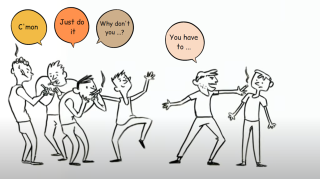Conformity
Who Influences Teens More: Peers or Family?
The answer depends on how comfortable parents are with the teen's choices.
Posted February 7, 2023 Reviewed by Michelle Quirk
Key points
- The influence of peers and peer pressure vs. the family on teen behavior is often overestimated.
- Teens have a choice of many different peer groups at school from which to choose.
- "Self-actualization" or making one's own choices in life is strongly influenced by parental validation or invalidation.

Harvard psychologist Howard Gardner states in his book Changing Minds that by about age 10 a child’s peers rather than the parents assume primary importance in the child’s decisions about what to do, especially in the United States. They are, he says, inclined to imitate those peers. This has become almost conventional wisdom in a lot of psychology schools.
Variety of Peer Groups to Choose From
Well, of course, peers do have a significant influence on kids, especially teenagers, but the question of who has more influence on them is quite a bit more complicated. The most obvious complication is that in the United States of recent years, there are a lot of different peer groups from which to pick. So what determines if a kid wants to be, say, a Goth or a jock? Even back when I went to high school back in the mid-'60s in Southern California, there were surfers, greasers, jocks, “brains,” “soches" (the popular crowd), guys in rock bands who wanted to grow long hair but were told by the boys' vice principal to cut it, theater people, churchy people, and a lot of kids who didn’t fit any of these classifications or straddled two or three of them.
With which peers adolescents choose to associate is not an accident of fate or necessarily the inclination of the developing child’s true-self tendencies. If their parents were pretty good about letting them learn to lead their own lives and develop their own opinions, then which peers they hung out with was most likely a result of their own developing self-actualization. But in more dysfunctional families, the kids’ behavior, as I have repeatedly discussed in this blog, is designed to stabilize unstable parents and maintain family homeostasis. If this is the case, the parents’ seeming needs steer kids in certain directions regarding their peers. For example, it may determine which kids turn into bullies and which turn into the bully’s victims.
Blaming Behavior on Cultural Influences Instead of on Family
This sort of question has been relevant in psychiatry, also. In the past, parents would allow their acting-out teens to be placed in psychiatric hospitals, where shrewd but unethical hospital administrators and psychiatrists blamed the adolescent’s emotional problems and misbehavior—or even their suicide attempts—not only on peer pressure but also on other cultural phenomena such as heavy metal music. Seeing Judas Priest being inducted into the Rock and Roll Hall of Fame, I was reminded of the time the band was actually sued for inducing two teenage listeners to commit suicide (a case ultimately dismissed) with “subliminal messages” in a song of theirs.
When doctors blamed environmental influences in this way, including peer pressure, the parents would not feel that they were being scrutinized or blamed, and would gladly pay up for “treatment.” Some hospitalized kids were kept there for months until their insurance ran out and then summarily discharged. Influences outside of the family were scapegoats offered up by hospitals to these parents.
Importance of Family Invalidation
Gardner also mentions how American children even by pre-adolescence have “evolved strong preferences” that may not align with those of their kin and/or ethnic group, and can often state their opinions strongly and stand their ground in disputes. Again, I can’t argue that this doesn’t happen, but, in my opinion, this is way overgeneralized. They may do that with certain opinions and planned activities, but not dare to question others.
Opinions and plans are hardly an all-or-nothing phenomenon when it comes to potentially challenging family homeostasis. If an opinion is expressed and, in response, Mom despairs while other family members massively invalidate the person expressing the opinion, children standing their ground is almost never the result. And families are all completely different from one another when it comes to which shared internal conflicts are present over certain things, how severe those conflicts may be, or how many of them exist.


